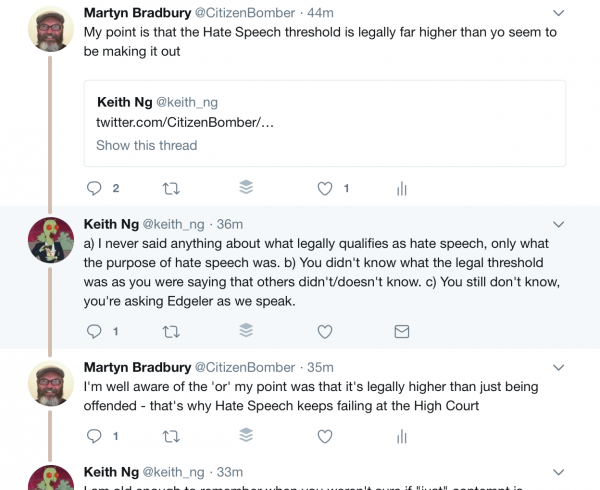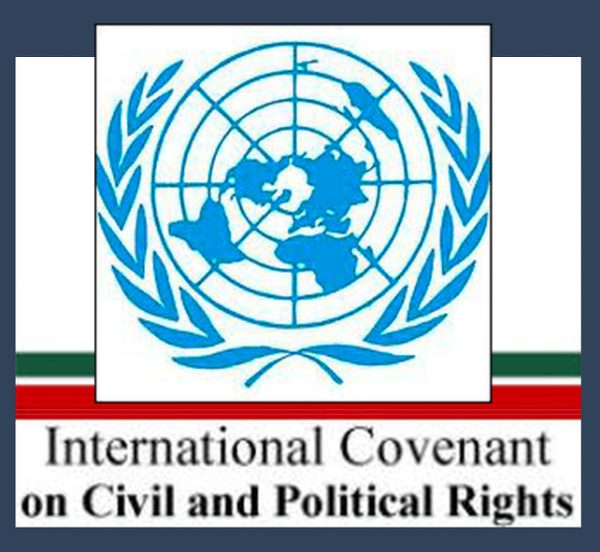
After a particularly unpleasant argument with Keith Ng on Twitter, I think part of the problem with the Brash, Molyneux and Southern debate is that there is a large amount of confusion over what ‘Hate Speech’ legally amounts to.
There are two competing laws, Section 61 of the Human Rights Act which states…
61Racial disharmony
(1)
It shall be unlawful for any person—
(a) to publish or distribute written matter which is threatening, abusive, or insulting, or to broadcast by means of radio or television or other electronic communication words which are threatening, abusive, or insulting; or
(b) to use in any public place as defined in section 2(1) of the Summary Offences Act 1981, or within the hearing of persons in any such public place, or at any meeting to which the public are invited or have access, words which are threatening, abusive, or insulting; or
(c) to use in any place words which are threatening, abusive, or insulting if the person using the words knew or ought to have known that the words were reasonably likely to be published in a newspaper, magazine, or periodical or broadcast by means of radio or television,—
being matter or words likely to excite hostility against or bring into contempt any group of persons in or who may be coming to New Zealand on the ground of the colour, race, or ethnic or national origins of that group of persons.
…and then there is The New Zealand Bill of Rights Act 1990 which gives everyone the right to freedom of expression, including the right to seek, receive and impart information and opinions of any kind in any form alongside the International Covenant on Civil and Political Rights, which obligates NZ to have due regard to freedom of expression in the BORA.
It isn’t enough to be offended or to find what is said as offensive for it to meet the threshold of ‘Hate Speech’ because the International Covenant on Civil and Political Rights and the NZ Bill of Rights Act sets the threshold incredibly high.
The Law Society have looked at this is in the wake of the Israel Folau case…
Many people appear to base their interpretation of hate speech by how offended they are. What’s the legal difference between what is considered hate speech and what is considered offensive speech?
“Section 61 applies only to things that are said about a racial, ethnic or national group. While racial slurs are highly offensive and upsetting, to fall foul of section 61 they must also expose the racial or ethnic group to hostility or contempt from another group of citizens.
“It is not enough that the targeted group feels insulted.”
…this high threshold is highlighted by the High Court in finding Al Nisbet’s cartoons didn’t breach the Human Rights Act despite being offensive…
High Court dismisses case that controversial Stuff cartoons breached Human Rights Act
At the tribunal hearing in 2014, Wall argued for a lower threshold in interpreting s61 of the Human Rights Act, allowing consideration for “subjective offence”. She initially lodged a complaint with the Human Rights Commission.
The tribunal found Stuff did not breach the Human Rights Act. It also found that attacks on the functioning of democratic institutions and the free communication of information and ideas highlighted the need for a vigilant free press.
“It is important the press continue to speak truth to power,” the ruling found.
“In a free and democratic society it is essential that the ‘space’ within which issues (including race) can be raised and debated must be kept as broad as possible.”
In May 2017, the tribunal ruled that while the cartoons may have “offended, insulted or even angered”, they were “not likely to excite hostility against or bring into contempt any group of persons in New Zealand on the ground of their colour, race, or ethnic or national origins”.
For that reason, the tribunal found the publication of the cartoons was not unlawful.
Wall then appealed that decision to the High Court.
…Hate Speech that incites contempt or hostility in others should be prosecuted, but we have an incredibly high threshold for that because mere offence isn’t enough of a trigger. Half the things I say about National Party voters could be argued to bring contempt upon them, but while I may be offensive to them, my free speech protections protect my speech.
We may find what Brash, Southern and Molyneux have to say as deeply offensive, but that’s not enough to strangle off their right to say those things. If they called for the violent and forced eviction of a group from NZ, that would breach the Hate Speech law, but how we define inciting hostility and contempt in others is something that has yet to be successfully prosecuted because of the importance of free speech to any democracy.







I suspect they’re far more clever than fall into that trap. They will push right up to the boundary – but shy away from crossing any such “line in the sand”.
Their tactic is to push their racist eugenics theories as “science” (which it is not), and let others do the ‘dirty work’. After all, if muslims aren’t “like us”; not “real people”; then the foot soldiers of the neo-fascist movement will take the hint and act accordingly.
Kinda reminds me of United States gun manufacturers. Smith & Wesson didn’t kill anyone on any college campus. They just sold the equipment.
At the moment, it’s all an academic exercise. Or a fierce contest of ideas.
But the moment a mosque in New Zealand is bombed, by an islamophobic alt-right ‘warrior’, then it takes on a whole new reality.
Far-fetched?
No.
We’re already had examples of terrorist bombings here in New Zealand and in each case (Trades Hall, Wellington, 1984 and Rainbow Warrior in Auckland, 1985) and in both cases an innocent person was killed.
The targets were both progressive institutions; a trade union, and an environmental group.
Do I have an easy answer to this? No, I don’t. It’s not as simple as we’d like to think it is.
Aren’t you forgetting a couple other incidents from our side though, Frank? First, the mentally ill Anarchist Neil Roberts who blew himself up trying to take out the police computer with a bomb he made for the purpose. Second, I recall comrade Valerie ‘Molotov’ Morse being caught in possession of pre-made Molotov cocktails; not something one tends to leave lying around the house just for kicks…
Nothing new to me, and if you have a good lawyer, you can sleep well any time, no matter what abuse you throw around.
Nobody cares about Philistine:
https://www.youtube.com/watch?v=fCzXAwafbmQ
https://www.youtube.com/watch?v=a-33tL5OJMc
Comments are closed.